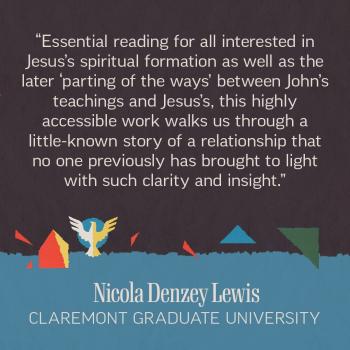I had the privilege of meeting David Williams (follow him on Twitter as @BelovedSpear) when we were both on a panel at the 2018 annual Religion News Association conference with the title “Close Encounters of the God Kind: Religion in Science Fiction.” I’ll include the video of that panel, which also featured John Scalzi and Farah Rishi, at the end of this post. David published a book recently with the title Christ in the Multiverse: Following Jesus in Our Wild, Infinite Creation. David kindly gave me the chance to interview him and ask him some questions after reading the book, which I recommend to those interested in exploring the intersection between Christian theology/religion, literature/fantasy/imagination, and science fact and possible. Here is the interview below. My questions are in bold and italics:
C. S. Lewis is your main or at least recurring conversation partner, even as you chat with the likes of Michio Kaku, Calvin, and Job. Is multiverse theology essentially Narnia theology?
My choice to have Lewis open my chapters as I explored the impacts of this cosmology on Christian faith was more reflective of my personal journey than any other rationale. Clive Staples Lewis is an old friend, my first place of entry into the world of fantasy fiction. My mom was a linguist by training, and had me reading at an absurdly early age. I was five (five!) when I read The Lion, The Witch, and the Wardrobe alone in my room in Nairobi, and it was a peculiar experience. Perhaps it’s a factor of a child’s imagination, but my memory of it isn’t so much of sitting and reading, but of physically being in Narnia. Snow underfoot, the warmth of the fire in a beaver’s den, the hard terrible cold of a stone slab. Multiverse theology is certainly implied by storytelling that engages with both faith and the possibility of other realms of being, but it goes far deeper than the green fields of Narnia.
Other than Narnia, what other science/speculative fiction offers theologically and spiritually useful exploration of multiple universes? (I recommend Christ Crawford’s The Tuning Station, but even a TV show like Fringe has something to offer of relevance.) What are your favorites? Should we encourage more theological multiverse fiction to be written?
Multiversal narratives are just about everywhere in sci fi and fantasy, and much of what they explore is wonderful for stirring theological and spiritual conversation. My favorites? Gracious. There are so many. Star Trek, of course. I think the series finale of TNG remains one of the most satisfying multiverse/interwoven alternative timeline tales I’ve ever had the pleasure of encountering. Others? Back when I was in high school, I was very into Michael Moorcock. The cosmology underlying the Elric saga is essentially multiversal, and Moorcock’s underlying explorations of law and chaos, power and the good? Fasckinating. When it comes to harder sci fi, I’ve been influenced by the writing of Stephen Baxter, whose explorations of the dynamics of multiple spacetimes really do verge on theology at points. Reading his classic “The Time Ships” was legitimately mindblowing. And yes, more multiverse fiction with a faith spin should be written. Any sufficiently thoughtful multiverse fiction is indistinguishable from theology, to flagrantly reword Clarke’s Third Law.
I am always grateful when someone draws attention to the importance of Paul Tillich’s writings, especially on the subject of God as ultimate. (I also appreciate when an author speaks my language and does things like throwing a reference to a “saving throw,” but that’s another matter). Is it surprising how much past theologians offer that is relevant to theology as it seeks to interact with cutting-edge science? Or do human beings perennially cycle through the same (or at least very similar) issues and worldviews? Which other authors desperately need to be (re)discovered by a wider readership because of their relevance to our time and the concerns of the present?
Tillich very much brought me back into faith in undergrad, but that’s a longer story. And if you like my reference to saving throws, you’d really enjoy the 2E spellbook for Christian clerics I wrote a couple of years back. Seriously. It was a loveletter/apology from Jesus folk to D&D, and may be the geekiest book in all of Christendom. [NOTE: The book is called Leveling Up: How to Be a Christian Cleric and is available on Amazon.]

Across the two millennia history of our faith, there are so many voices that have faded from memory or have drifted into the shadows. My own favorite lost voice is that of George MacDonald, whose fierce Scots mysticism, radical focus on the power of divine love, and willingness to challenge the cold utilitarianism of industrial Western culture still powerfully resonate with me. That he was the author of some intense, dreamlike multiverse-friendly fantasy novels really works for me, too, for some reason.
Having multiple conclusions is helpful in a book like this, but also a symbolically interesting approach. Are the parallels between the multiple worldviews we inhabit as human beings, and the multiple universes that may exist, merely a useful metaphor (just as there is a metaphorical and symbolic connection between the theory of relativity and relativism/acknowledgement that differing perspectives can both be true within their framework) or is it more than that?
I figured it’d be apropos to have a choose-your-own adventure ending, given the topic. It’s more than a metaphor, I’d say. One of the most potent challenges for ethics and morality in a multiversal cosmos is how the multiverse tests our idea of the good. Is my understanding of the good (radical compassion, agape love, and an openness to the personhood of the other) more “true” than the understanding that rises from Ayn Rand’s objectivism? If a physically identical version of me exists in another spacetime, and that David Williams somehow read, enjoyed, and treated Atlas Shrugged as life-changing literature, why am I more legitimately good than that iteration? Why do I feel I have a right to make that moral claim? That’s one thing if it’s just a thought exercise, and rather another if I understand that to be the nature of existence itself.
If there is a subject I expected more on it was the ethical and theological implications of an infinite multiverse and or parallel universes, in which everything happens, and/or in which there are countless versions of us with different morals and faiths. In a universe with Spock’s beard (as in the mirror universe in the Star Trek episode, not the band Spock’s Beard), how does or would theology need to be different in order to take seriously the existence of other versions of ourselves whose moral outlook may be different? How for that matter does a multiverse in which someplace like Narnia might really exist need to be different from one in which Narnia is just the stuff of stories? And how do we do theology from a perspective that may know that many universes are likely to exist and yet they will be beyond our reach and knowledge for the foreseeable future and perhaps forever?
The theological implications of a multiverse creation are intense. What does it do to our vision of God, if God’s creative power extends beyond our spacetime? What does it do to our understanding of the Bible narrative, and to our understanding of providence and the purpose of being? The ramifications go well beyond what a single work could sanely manage.
The ethical question also goes deeper than I think any one book could reasonably probe, which is why I made it more playful in tone. One has to know one’s limitations, eh? I do lay out what I’ve come to view as the essential dialectic of multiversal ethics. First, that if moral action can only create probable outcomes, ethics has to consider the goodness of an action in terms of most probable consequence, not certain consequence. Second and deriving from the first, that given the uncertainty of any particular outcome, an action must inherently reflect the ethical framework driving it. Decisions must be good in and of themselves. Evil cannot be justified in terms of a potential greater future good. Ultimately, that splits the difference between consequentialist and deontological ethics…or creates a necessary synthesis between the two.
As for the reality of Narnia in the multiverse, I really hope so. I haven’t yet found the ring that would take me to the Wood Between the Worlds, but I do look now and again. What other realities should force us to consider is the universality of our ethical systems and our faith. Stripping away the assumptions of national, ethnic, and other contingent identities, is the faith we proclaim still relevant? If not, we’ve just made ourselves an idol.
______________________
I am grateful to David for the chance to read his book and have this conversation about it. Here’s the panel we were both on, which you may enjoy if you’ve never seen it before (and perhaps even if you have!):














